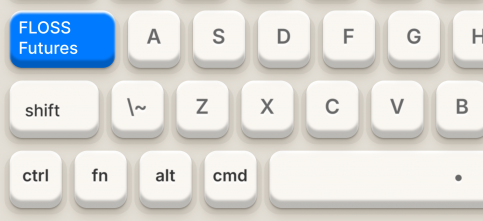- Topic 7: As computational techniques develop, what do you see changing in the community you are contributing to? What future challenges and what ethical issues should you consider for the future?

Introduction
Contributing to the freeCodeCamp Italian translation project has helped me understand more about how Free/Libre and Open Source Software (FLOSS) communities are evolving. As new computational technologies advance, these communities face both new opportunities and important ethical considerations that will shape their future.
AI in Open Source
One significant development is the growing use of AI-powered tools in open-source projects. While AI can speed up some tasks like translating text, my experience with post-editing AI-translated articles showed that these tools often make serious mistakes, such as translating technical words incorrectly or skipping large sections (as I explained in my documentation blog post). This underscores that the necessity of human review is still essential to ensure that the content is clear, accurate, and trustworthy.
The use of AI also raises important ethical questions. As more contributions are made by AI, it’s essential to consider who receives credit, who is accountable for mistakes, and whether the AI itself reflects bias. FLOSS communities will need clear rules and standards to manage these issues while staying true to their core values of openness and teamwork.
Licensing & the limits of freedom
In the article “A Brief Guide to FLOSS” (Łaszkowicz, 2020), the author explains that open-source licenses allow anyone to use the software freely, but this can create conflicts when it’s used in ways the original creators don’t agree with. This highlights the need to think more carefully about how to include ethical concerns in licensing, without losing the openness that makes FLOSS special. A clear example is Joe Redmon, the creator of the popular YOLO (You Only Look Once) computer vision algorithm, who chose to step away from his research due to ethical concerns. Redmon was worried that his open-source work could be exploited for harmful purposes, particularly military applications and surveillance, which conflicted with his personal values (Analytics India Magazine, 2023). This case underscores the complex ethical dilemmas developers face when their open-source contributions are freely accessible but may be used in ways they never intended or support.
Corporate influence & community values
Furthermore, the talk “FLOSS, the Internet and the Future” (2019) emphasises the role of FLOSS in fostering digital freedom and resisting monopolistic control. While FLOSS has made great strides, the influence of large corporations can sometimes conflict with open-source values. For example, React, a widely used open-source JavaScript library originally licensed under a controversial “BSD + Patents” license, restricted users from suing Facebook, its creator. This unusual clause raised concerns about fairness and openness, leading to community backlash and ultimately a license change to the more permissive MIT license in 2017 (Hughes, 2017). This case highlights how the dominance of tech giants can challenge FLOSS principles, underscoring the need for ongoing vigilance and commitment to openness and user empowerment.
My experience
During my own contribution to freeCodeCamp, I encountered a technical issue where the system failed to assign me a translation task when I used the “/translate” command. I reported it, and it was later fixed, demonstrating how open communication within FLOSS communities helps solve problems and improve processes (more on this in my documentation blog post). This experience showed me how important it is to build systems that are accessible and adaptable for contributors of all backgrounds and skill levels.
Conclusion
Looking ahead, FLOSS communities must keep growing in ways that are inclusive, ethical, and responsible. They must think carefully about how to use tools like AI, and continue making space for diverse contributions. If FLOSS communities remain open and mindful, they will continue to show how collective effort can build tools that serve everyone.
In short, the future of FLOSS depends on our ability to adapt to change while staying rooted in its core values: freedom, collaboration, and responsibility.
References
Analytics India Magazine, 2023. YOLO creator Joe Redmon steps back from computer vision research citing ethical concern. Available at: https://analyticsindiamag.com/ai-trends/yolo-creator-joe-redmon-computer-vision-research-ethical-concern/ (Accessed 27 May 2025).
Baker, M., 2019. FLOSS, the Internet and the Future. FOSDEM VZW. Available at: https://doi.org/10.5446/44272 (Accessed 26 May 2025).
Łaszkowicz, P.J. (2020) A Brief Guide to FLOSS | Medium. Available at: https://medium.com/@siilime/flossing-correctly-64fa3c1d9bf0 (Accessed: May 26, 2025).
Hughes, M. (2017) Facebook re-licenses React under MIT license after developer backlash. Available at: https://thenextweb.com/news/facebook-re-licenses-react-mit-license-developer-backlash (Accessed: May 27, 2025).
